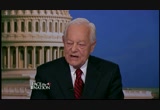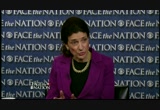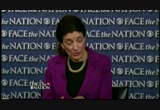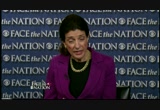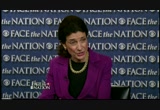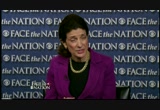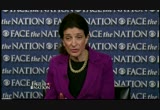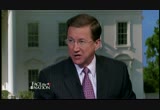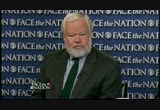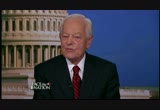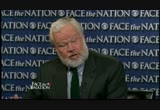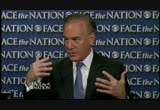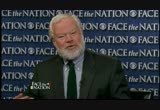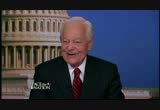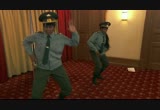tv Face the Nation CBS November 18, 2012 5:00pm-5:30pm PST
5:00 pm
in the senate. and i have to say, senator, to me, it was another sign, a real sign that our political system is broken when you announcethat you were retiring from the senate because you just couldn't get anything done there anymore. and it will be the senate's loss. but we wish you well. let me just talk to you-- and i do want to talk to you about your reasons and all of that, but first, you're a member of the intelligence commit, where do you weigh in on this whole benghazi situation? >> well, first and foremost, we have to get to the truth, and as a member of the senate intelligence committee, we're doing exactly that. we have had it at least eight hours of hearings this last week. we intend to have at least three more hearings and publish a report at the conclusion of those hearings. what is most disturbing, in my estimation, is the discrepancy about those talking points and the reality that exist on the ground, and why the administration wasn't able to
5:01 pm
get the information in a more accurate picture of what transpired and delivered to the american people with confidence, and pulling the pieces together in a way that we knew exactly who was responsible you know, for killing four of our americans and attacking our facilities. and, unfortunately, they didn't do that. it took so long-- in fact, it took 17 days for the director of national intelligence even to issue a statement to say that it was a deliberate and organizeterrorist attack. that's unacceptable in today's environment. >> schieffer: do you have any answers yet as to why-- we know that they had asked to maintain their-- the current level of security and that was turned down. do we have any idea on what that decision was based on? >> no, and we're still getting to the bottom of that. that's one of my primary concerns. and that's certainly what i'm driving. first of all, why there was failure for adequate security at
5:02 pm
the temporary mission. and secondly, why they didn't assess the security risks posed to that facility? they had abundance of threat reports and incidents, both to that facility and other consulates that would have suggested that they were in a high-threat environment. i sponsored-- i cosponsored the initial legislation-- i was the lead republican in the house-- to create the diplomat security bureau and the accountability review board that also has been initiate so we can get to the bottom of who is responsible. there was minimal security. the barriers weren't sufficient. the attackers, the mob, overran the complex. the militia we were depending on disbursed, did not provide defense, and we had very few security personnel-- >> schieffer: on the anniversary of 9/11. >> exactly. >> schieffer: let me ask you this, have you established why the ambassador went there on
5:03 pm
9/11. obviously, the ambassador in any country knows the intelligence situation. he should be the most informed person in the country, because the station chief of the c.i.a. reports to him, basically, as does everyone else in the country. do we know why he went there? >> well, my understanding is that he had preestablished meetings, obviously aware of the environment that existed there. but he liked to commingle with the people in libya and in benghazi and, you know, had prepared for this trip and didn't disrupt it in making those decisions about preplanned activities. but it's clear, we've got a lot of answers to secure regarding the overall lack of security and why the intelligence community weren't-- wasn't able to get the message out and the administration as to why we didn't have a full and complete pictures too who was responsible in the days following that
5:04 pm
event. >> schieffer: senator, i want to ask you about your retirement, because i really did think it was kind of a markener time. when a member of the senate would say this is no longer the place that one can accomplish anything. this must been a hard decision for you. >> it was very much so, bob, and i appreciate your comment. and i did-- and it was something i had to think about, and i started to think about the future of the senate and what had transpired. it wasn't what i had been accustomed to building bipartisan bridges and i felt i could be a more effective voice on the outside and building bridges and providing a support system and a network to support members of congress who are willing to work across the political aisle. i'm building a web site through social media as well so people reward those individuals who are willing to compromise. >> schieffer: what has gone wrong? when i came to washington, people compromised. now it's a dirty word?
5:05 pm
when did that happen? >> well, you know, it's a good question. it happened, unfortunately, story rapidly, and somehow people think compromising is capitulating on your principles. far from it. you have to talk with people whom you disagree. i thought how best i contribute my 34 years of experience and voice on the outside so that we don't return to this kind of dysfunction ever again, especially at this moment in time for our history. but the essence of public service is solving problems, and we've lost that central purpose. and we have to return to it. and hopefully, we have some starters here with the fiscal cliff decisions, that we can have confidence-building measures in the final analysis. because there's a sense of urgency. so hopefully the concillation of words will turn into urgency of action. >> schieffer: are you optimistic at all about them find something way to get past this fiscal cliff? >> um, i think they will.
5:06 pm
you know, i think on the short term they have to. because every thing will ratchet up the risk to the economy. we've already seen a 600-point crop in the dow jones. europe has returned to recession. we could trigger a double-dip recession. we could ill afford to repeat the debacle surrounding the debt ceiling crisis in 2011, that created the highest level of policy uncertainty over the last 20 years, surpassing the wares, surpassing nav 9/11, and even surpassing the financial crisis. we have no choice. i hope they have gotten the message from the last election. people want their elected officials to work together. >> schieffer: senator i want to thank you for being with us this morning. i want to wish you the best of luck, and washington wil will be less because are you no longer a member of the senate. we wish you well. >> thank you, bob, very much,
5:07 pm
for those kind words. >> schieffer: and we'll be back in one minute. they have teachers... ...with a deeper knowledge of their subjects. as a result, their students achieve at a higher level. let's develop more stars in education. let's invest in our teachers... ...so they can inspire our students. let's solve this. music is a universal language. but when i was in an accident... i was worried the health care system spoke a language all its own with unitedhealthcare, i got help that fit my life. information on my phone. connection to doctors who get where i'm from. and tools to estimate what my care may cost. so i never missed a beat. we're more than 78,000 people looking out for
5:08 pm
more than 70 million americans. that's health in numbers. unitedhealthcare. >> schieffer: well, there's been a lot going on in washington this week, to say the least. the investigation into what happened in benghazi, what happened to general petraeus. we're going to talk to our panel now back again, "washington post" columnist david ignatius. longtime defense writer for the "washington post," tom rickes, now the author of a new book called "the generals: american military command from world war ii to today." and cbs news state department correspondent margaret brennan, margaret, welcome to you, and cbs news justice correspondent bob orr who has been following all of this situation. let's talk-- let's just start here at home. where are we on all of this situation involving these investigations into general petraeus, into benghazi? i mean, bob, how many
5:09 pm
investigations are going? >> i know of three right now, bob. the c.i.a. inspector general is doing an internal review of whether or not former director petraeus misused any agency assets during his 14 months on the job. so that's number one. number two, the department of defense inspector general is looking into these communications and e-mail betweens general allen and jill kelley, the tampa socialite. there are interesting developments there. this started out as a raft of information. we were told 20 to 30,000 e-mails and communication back and forecast. that was adjusted downward to a couple hundreds. now we're told it's just a hand full of questionable and perhaps problematic e-mails. and of course the third track involves paula broadwell, biographer of petraeus. and the f.b.i. still has an investigation into broadwell because of her handle ago and perhaps mishandling of of classified information. and there could be other investigations, frankly, we are not aware of. >> schieffer: tom ricks i was
5:10 pm
struck by something you wrote in an op-ed or someplace that you didn't approve of general petraeus and paula broadwell but you also thought it was none of your business. >> i think there are two scandals in the whole petraeus affair. the first scandal is why the f.b.i. was looking into lovers' quarrels. the second and more troubling to me is that we seem to care more about the sex lives of our generals than the real lives of our soldiers. everybody can tell you the name of paula broadwell. nobody can tell you the name of the americans killed in afghanistan in the last week. i saw some stats that said there were about 50 casualties in afghanistan, which is dead and wounded, since petraeus-- the petraeus affair came out. nobody is paying attention to that. to me, a real scandal is that we tolerated years of mediocre generalship in iraq before petraeus actually did a good job there. a real scandal is that we've had 11 years and 11 commanders in iraq.
5:11 pm
that's no way to run any business or any operation, that fast turnover. i come away wondering why americans don't pay attention to these wars until they become titillating. >> schieffer: david, is that because we now have the all-volunteer force and, you know, people who don't have a relative or someone they know involved in the military and i know a lot of people that don't know a single person in the military. i mean, i can remember world war ii as a little boy. everybody knew somebody that was involved. somehow now we don't seem to know the people in the military, and they don't know us any more. is this what tom is talking about? >> i think so, to a disturbing extent, the military has become a different tribe in american society. it's a tribe that americans value enormously from a distance, when soldiers walk through airports, they get spontaneous congratulations, when they walk onation, people stand up and want to shake their
5:12 pm
hands. i had a senior military officer say to me, this is not a healthy situation for us. we need to be part of the country. we need to be judged by reasonable standards. tom makes a great point that we need to judge our generals by their performance, and if their performance isn't good, we shouldn't sing their praises, these wonderful volunteers-- we need to say perhaps another commander is appropriate. in the case of general petraeus, the only thing i take issue with, tom, about is-- and i think general petraeus would say this himself-- c.i.a. personnel are expected to report any contact they have with people who could have power over them, who could be in a position where they knew things that the disclosure could be embarrass or worse and make the official with classified information vulnerable. c.i.a. personnel are held to that rule, and you have to hold the director to it. it's clear general petraeus recognized the fact of that. that doesn't go to some of the larger issues that are being
5:13 pm
spun as this thing gets faster and faster. >> schieffer: margaret, perhaps more important than all of that is this investigation going on into what actually happened in benghazi. where are we in all of that? you heard john mccain this morning. then you heard dick durbin, and then you heard olympia snowe. how is this impacting out at the state department? >> this is one of the most sensitive topics. people feel very personal and take this in a very personal way, this attack. but then you also get foreign service officers on the sidelines who will say to you, "we are very concerned about security. we are very concerned about other soft targets out there." the department of defense and the state department are reviewing other compound right now to see if other benghazis could exist. there's a real question about the relationship between the c.i.a. and the state department, how they coexist in some of these locations and support each other. but we're really stuck in this lightning rod right now, this question of why the-- "the--
5:14 pm
when we knew within the first 24 hours there was credible intelligence that suggested that's what happened i in benghazi. >> schieffer: let me ask the obvious question. why were they so reluckant to talk about terrorism? bob? >> reporter: the people i talk to at c.i.a. and others around town knew pretty early on there were elementes of islamicim radical groups involved in the attack. so early on, they knew there were some loose association if nothing else, of people who participated in this attack on the consulate. when the information got over to the white house, al qaeda became extremists, and when susan rice went on television, went on this program to talk about what she knew, she took perhaps the most benign interpretation of the information in front of her. but to be clear, this happened in the political season when
5:15 pm
everything is politicalized and looked through the prism, and i think it's-- we knew what we knew at the beginning and that really hasn't changed. >> schieffer: do we think they changed this around for political reasons, tom? >> i think the phrase "in the political season" is the most importance phrase. it really strikes me that no one can tell me how many security contractors were killed in the iraq war. i've looked into this, working on my books on the iraq war. everybody seems to tell you about the four people in benghazi. so i'm a little bit suspicious of the motive in talking about benghazi so much when nobody's paying attention to this stuff for years. >> i would just make one point, dirty little secret here is that our intelligence analysts don't know even now how all these factors came together outside the consulate on the night of september 11 so that the consulate was overrun. and that was the-- one of the problems in the days immediately
5:16 pm
after. they did have intelligence that people linked with al qaeda were in that crowd. but in terms of preplanning, of directives from al qaeda in the magreb, or other senior al qaeda leadership to those people to do something, they don't have that. they had very quickly intelligence that people in that group that attacked the consulate were watching what happened in cairo live on tv, and they had surveillance of them talking about it, and then they go to the consulate to attack. so they were trying to figure out what's the mix of that spontaneous driver and the fact that we know there's part of organized terrorist groups, and, you know, there is a fog of intelligence analysis and that's a part of what you're seeing here. >> schieffer: well, what i am having trouble with, is anyone-- no one should be more informed or what the situation is in the country than the ambassador. he should have access to all the intelligence. and ambassadors do. why would the ambassador go to
5:17 pm
benghazi on the anniversary of 9/11-- obviously, that was a date to be considered in any kind of moment-- why did he go, margaret? >> he was supposed to be there to open a cultural center there in benghazi. that's why he was officially there. we may not get some of the answers to these questions until secretary clinton goes to the hill with the probe that the state department did in her hand. sources tell us that probably won't be until the end of december. a lot of that information is going to be about the questions that the state department has asked themselves. it won't necessarily get us inside the white house. it won't necessarily get us inside the c.i.a. and some of their decision making, but it will lay out what happened, when the requests were made for security, and why, perhaps, they weren't fulfilled in the way that some have said in hindsight they should have been. >> schieffer: bob, i want to go back to you with all these investigations going on. do you see any prosecutions coming here? >> there's going to be a lot of
5:18 pm
political pressure, i think, on the f.b.i. at the end of the day to produce something. that's just my opinion. but you have the c.i.a. director stepping down. you have general john alep who is nominated to be the supreme allied comabdener europe now under a cloud of suspicion. it's hard to imagine you dust your hands off and say, "well, that was messy." i think there is going to be at least some internal and probably external pressure in the foible on pursue a case, and most likely against paula broadwell. the one thing that might be prosecutable was her handling of classified information. she had clearance to have access to the classified information. what she didn't have what people with clearances don't have is permission to take that information outside of the secure realm. they found it in her home. they found it in her files. we need make a point-- she's been cooperative with investigators about this and it really would be a relative smack on the hands, i think, to prosecute that charge but it might produce something in the end of the day.
5:19 pm
>> schieffer: you know, that's something that is not taken lightly in security circles. who was it john deutche, former c.i.a. director who was fired because he took classified information home with him. >> i don't know, it all reminds me of the nanny tax kerr if you havele a few years ago. if you hang around the u.s. military you're constantly getting classified information. it is handed to you, to explain things. if you embed in balling rab, for example, you sit in on meetings. that you had it on the wrong laptop, i find that the smallest bureaucratic outcome and almost meaningless. >> schieffer: what's going to happen in israel, david? >> well, i think israel is poised, ready to attack, showing it's ready to attack. i don't think it wants to. the question i hear israelis and u.s. officials asking is where does this lead?
5:20 pm
is israel really in a situation that it has no alternative except every five or six years to take a pom at its adversaries -- is what one israeli official told me-- or is there some pathway to stability, and could it involve a new government in egypt. so that's where i think everybody would like to see it head. obama has worked hard to talk to them to try to steer it in that direction. will that happen? >> the most phones call that secretary clinton has made from the road have been to her counter-part in egypt. and they have been very clear that egypt has a relationship, they have the credibility and influence in the region to push hamas to stop the attacks. now, there is also a fair amount of funding being held up in washington right now that the egyptians need very immediately. remember, they weren't just one of the top recipients of foreign aid. they have a funding crisis. they have literally been to the point where they have had problems paying bills. so there is some immediate leverage to gets them to act
5:21 pm
immediately. whether that ends up being effective or not is another question. >> schieffer: well, do we think the administration-- obviously, i would guess they're advising the israelis not to invade. but what beyond that are they trying to do? is this an opening to start a-- the peace process to get it started again, david? >> bob, if-- if-- if mursi, and turkey, the key players, in working toward a cease-fire, we're likely to have a cease-fire. we'll either have a cease-fire or israeli invasion. if there is a cease-fire that is the kind of thing that can be a building block. if you can pull everybody together, as mad as the egyptians will be, as indignant, that's the start of the process of discussion. that will be a good step. >> do you think lebanon is next? >> well, if-- some people think what this is about is in preparation for a likely war with iran. israel testing the rockets that
5:22 pm
would be fired against it from gaza, next from lebanon. so we may see something with lebanon soon. they say preliminary, this is a kind of warm-up round of the real conflagration ahead that involves iran. >> schieffer: you really think there's a chance israel would strike iran and try to take out those nuclear-- >> yes, especially given the timing of the gaza thing. they wait until after the american elections were over and now they're getting down to business. >> schieffer: all right. thank you all very much. let's hope everything comes out well. i'm not sure we got any information that indicated it will here today, but we can always hope. we'll be right back. for over 60,000 california foster children,
5:23 pm
the holidays can be an especially difficult time. everything's different now. sometimes i feel all alone. christmas used to be my favorite. i just don't expect anything. what if santa can't find me? to help, sleep train is holding a secret santa toy drive. bring your gift to any sleep train, and help keep the spirit of the holidays alive. not everyone can be a foster parent, but anyone can help a foster child.
5:24 pm
>> schieffer: well, that's it for today. before we go we want to tell you that cbs news is announcing today major garrett of "national journal" is joining us as our new chief white house correspond. he was a major contributor to our campaign coverage and will continue to write a column for "national journal."
5:25 pm
5:27 pm
5:29 pm
213 Views
2 Favorites
IN COLLECTIONS
KPIX (CBS) Television Archive
Television Archive  Television Archive News Search Service
Television Archive News Search Service  The Chin Grimes TV News Archive
The Chin Grimes TV News Archive 
Uploaded by TV Archive on

 Live Music Archive
Live Music Archive Librivox Free Audio
Librivox Free Audio Metropolitan Museum
Metropolitan Museum Cleveland Museum of Art
Cleveland Museum of Art Internet Arcade
Internet Arcade Console Living Room
Console Living Room Books to Borrow
Books to Borrow Open Library
Open Library TV News
TV News Understanding 9/11
Understanding 9/11